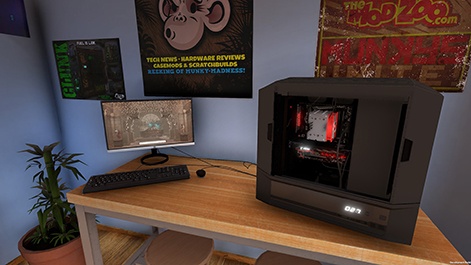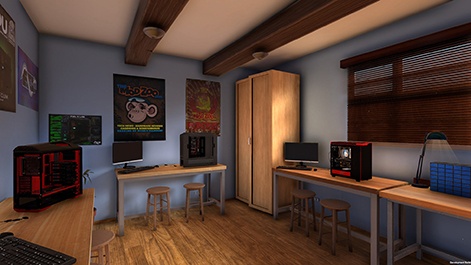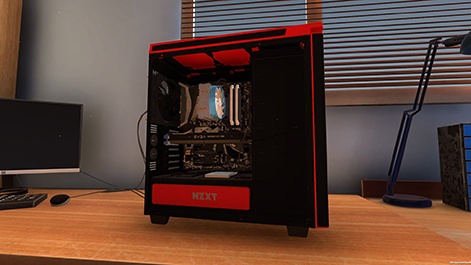PC Building Simulator hasn't wasted much time in being a hit for publisher The Irregular Corporation. The project - made by solo developer Claudiu Kiss - was found by the firm on indie games storefront Itch.io and was founded on a simple idea: putting together PC hardware on your own PC.
What sounds like a pretty niche idea has been rather popular. In its first month on sale, PC Building Simulator has sold 100,000 copies. It isn't just gamers who are interested; teachers want to get the title into the classroom.
We caught up with producer Stuart Morton to find out more about the project's success.
How would you say things have gone since launch?
It's been phenomenal really. I have been doing a lot of work in the last three or four months bringing various hardware manufacturers on board. We knew that fanbase was growing and with all our the partners we were bringing on board, we knew this had potential to do really well but we didn't know; no-one knows. When you release a game on Steam these days you don't know. The middle ground between success and failure doesn't seem to exist anymore which is a difficult thing. We all hoped it would do quite well but it's safe to say it's blown those expectations out of the water.

You have partnered up with some pretty big hardware companies, including MSI, Corsair, AMD, Cooler Master and GigaByte for the title. What was your pitch to these companies?
It hasn't been easy - none of this legal stuff ever is. But for the majority of our hardware partners, it's been fantastic. Right from the start they've been really supportive and have provided us with assets used to help make the models more accurate, all that sort of stuff for the game. The pitch was basically: 'Do you want your stuff in our game? We're making a simulation about PC games hardware'. It gets easier as you go on and have more names signed up because their competitors are doing it so they want to be involved. Ultimately, it's free advertising for all the companies involved in it, assuming that the game does well and everyone enjoys it. They just need to say yes to being in the game and we do the rest of the work.
It's good for our players; they get the real hardware. No-one wants fake named parts in a simulation game. You can do it but it's never really the same. Having these licenses lets us have all the real parts and keep them accurate. And having the voices of those companies behind us when we launched helped, too. We'd love to get to a point in the future where a company is about to release a new range of hardware and then we can simultaneously launch that hardware in the game. That's good for them but it's also good for players so they get new stuff and can see what it's like before they go out.
These conversations I've been having with every single hardware manufacturer out there. The ones that haven't been announced have sped up somewhat since release. Licensing anything for games is always tricky; there's always the concern about whether a game is going to do well, will it harm a brand by being included? Now it's out, done really well, the reception is really positive, it's - in theory - an easier decision to make. Now the question is: 'Why shouldn't be involved in this?'

Since Goat Simulator and Surgeon Simulator, 'simulator' in a game's name has become something of an industry joke. Was this something you were concerned about?
Definitely. We didn't pay a huge amount of attention to that internally because we knew what we were doing. At the PC Gamer Weekender, lots of people walked past and thought it was another joke simulator game. You can do the Surgeon Simulator thing and make it super physics-centric - a more fun simulator route. But that probably wouldn't have been a good idea. It's hard to know if that's something we can do at some point down the line. We probably wouldn't have got licensors if we'd done that because no-one like seeing their hardware being thrown around or melted or thrown around. Licences are great but they come with strings. You have to be very careful what you do with other people's copyrighted trademarks.
Why launch into Early Access?
Early Access - certainly in my experience - isn't something we'd aim to do by choice. We try and avoid it where we can. Particularly with this kind of stuff and space, community feedback is really important. We got to the point with PC Building Simulator where we had such a big community already building around it who were so eager to play it that we figured we'd just get it to a point where it was pretty robust; most of the core features were there which is what we did. We had done as much testing as we could to make sure it was as polished as we could make it and thought we could release it as it is now and users would be able to get ten or 20 hours of gameplay out of it. It was solid. Our thinking was to get people into the game, get them invested early and just start giving us feedback. With any Early Access game, you think you'll take a hit from people not wanting to touch an Early Access game, which I suspect is still the case with this, but there'll be a good number of people who don't want to go near it because it's Early Access. That's fine. We're only looking at a short Early Access period. Ideally, we want to be out by the summer; three or four months maximum, was always the plan. It's very early days so it's hard to know where it'll go and what interest there'll be in a few months time. We're pretty hopeful that once it gets out of Early Access the audience will only broaden.
Back in 2013 and 2014, titles that launched into Early Access - such as Rust and DayZ - were very much early, alpha builds and were set to come up way in the future. Now companies are releasing way later in development: PC Building Simulator appears to be an example of that, as are projects like Playerunknown's Battlegrounds and Dead Cells. Why do you think there's been that shift?
Early Access has had a bad rap because so many people use it as a way to make money. If they release something, people will buy it, is the thinking and that'll keep them going. Since Steam has become more open over the years, more Early Access stuff has come out, been broken, people have been burnt and don't want to touch Early Access stuff now. The best way to do Early Access is to wait until you're near there, then release it in Early Access if you want to go down that route. It's definitely still a valid way to launch your game if there's a valid reason to do it. It probably doesn't make sense for certain games but for simulator games - with the detail you're going into and the passionate fans you want to get into your game early and give you feedback - it's a great tool.

What's your post-Early Access launch roadmap looking like? Has this accelerated with your early success?
It hasn't sped up too much. We've been out a month now and we've released an update every week since launch to keep things going and fix issues. It's always important in Early Access to keep updates coming, communicating with fans to make sure this isn't just another Early Access game that's come out, done fairly well and now everyone has buggered off and left it. This week will be the first that we haven't done an update just because we have bigger feature sets coming up. The success we've had hasn't sped up plans too much. The updates we're doing are just features that people want right now. People wanted the music player in-game to play their own local MP3 files so we updated it so you could do that. It's nice to be able to get that feedback and roll that into current development plans.
You can get the latest news and analysis about the business of PC games on Facebook, Twitter and Linkedin. You can also sign up for our newsletter right here.


















